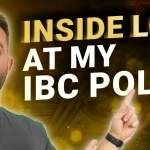In this episode, we discuss the value of making loans funded through an infinite banking policy. We also share the way loans affect infinite banking policies and the real way you should think about the structure.
We’re often asked by our clients and podcast listeners how loans affect infinite banking policies. People frequently also ask what impact the loans will have on the death benefit beneficiaries.
Today, we answer those questions and more.
How Loans Affect Infinite Banking Policies Topics Discussed:
- Policy loans and the impact on wealth transference to beneficiaries
- Whether or not a loan is a prepayment on a death benefit
- An overview of how loans affect the math and put you ahead
- How the death benefit alone is not the full picture
- The value of making a loan and the value that the policy can add
- A 13-million dollar case study
Episode Takeaways:
Powered By the Tweet This Plugin
Episode Resources:
Podcast transcript for episode 62: Loans Affect Infinite Banking Policies
Nate: In this episode, we will discuss the value of making a loan, especially when that loan is funded through an infinite banking policy and also, we’ll discuss a little bit of how policy loans effect your policy and the true way you outta think about that. Internally in the policy. She’s Holly and she helps people find financial freedom.
Holly: He’s Nate. He makes sense out of money. This is Dollars and Nonsense, if you follow the herd, you will be slaughtered.
Nate we kind of came up with this because I’ve been having a lot of conversations lately with clients and our previous podcast even about money city about the fear of taking a loan out from their policy and how that would affect their family should something happen to them in regards to the death benefit. And oftentimes you’ll hear us say “Oh a loan is a pre-payment of the death benefit” basically meaning if the loan’s not repaid it comes out of the death benefit plus the interest owed. And really trying to help individuals understand that a loan in and of itself within the policy allows you the freedom to have uninterrupted compounding but, actually generate even more money for your loved ones over the long period of time.
Nate: We’re gonna kind of talk about two things today. One is kinda answering that question or reviewing what’s actually happening when I pull money from the policy in a loan and really why you shouldn’t be concerned by it and we’ll expand on that, maybe answer the question that you’ve received. So, I think we’ll start there but then we’ll also discuss, as we are building this banking system up, at some point, I hope you’ll have more money than you need, personally.
And then we’ll be looking for other avenues to create value with your policy. One of the big ones that has hit true with a lot of our clients is becoming a lender, we call it entering the bank business for real, and whether that’s just lending money to your family which happens all the time, owning your kid’s mortgages and car loans, things like that, it’s pretty exciting. Or, whether it’s actually lending to other people that are not really family members, that you’re just doing purely as an investment as well. And, essentially, how profitable that can be in and of itself but then also how profitable it can be when tied to a policy so, that’s two-pronged there. We’ll start with the first one which is discussing what’s going on inside the policy, when do we take a loan and why we shouldn’t be concerned so, what kind of brought this up?
Holly: What brought it up was a client was concerned really that if he borrowed a hundred thousand dollars out of his policy and, he has a hundred thousand to be able to borrow, he’s just let the money sit for a period of time, it basically would cost his wife or family, if something happened to him, a hundred thousand dollars of death benefit.
Nate: Let’s say his death benefit was a million.
Holly: Yes, so he leaves them nine hundred thousand instead of a million.
Nate: And he takes a hundred thousand dollar loan, dies the next day, the death benefit that was a million has a one hundred thousand dollar loan balance on it so their family would get a check from the interest company for nine hundred thousand. And he was saying, I’m a little concerned that they wouldn’t get as much as they needed or whatever it is.
Holly: They won’t get the million dollars and then they’re out a hundred thousand dollars just because I took this loan out and yet what he couldn’t see is what the loan did for him and his family. What I did is just go through some numbers with him of saying, let’s say that hundred thousand dollars, Nate and I were talking about this earlier, whether it was to buy two cars and one for his wife and one for him maybe that they needed because their other cars were no longer viable or they needed to be replaced. If he doesn’t take it out of there, out of his policy, he’s gotta borrow it from somewhere.
Nate: I’ve been asked this question too Holly, plenty, as you kind of alluded to, well what happens if I die and I have these loan balances, is my family gonna get less? They’re kinda misthrowing the nickel and the dime there as you alluded to. I don’t care what he wants to do with the hundred thousand.
Holly: No, I don’t either.
Nate: The worst thing I guess he could do is blow it all at the casino. But, otherwise, we’ve gotta do something with the money.
Holly: Yeah. Whether it be taxes, mortgages, vacations, education, you can name whatever that hundred thousand dollars is gonna do but, what Nate and I have done is actually to pull out the numbers to say, here’s what happened let’s say you did a hundred thousand dollars and he actually was using it to reduce his mortgage or take over his mortgage and he’s gonna pay it back to himself over fifteen years. Now most people don’t understand the money never actually left his actual life insurance policy, it was a loan from the life insurance company to him. And the collateral for the loan is that death benefit. But, he’s still got the hundred thousand dollars growing, uninterrupted.
Nate: Well if we kind of focus too on the death benefit as well Holly just for a second, let’s say we did take a hundred thousand out and we made a down payment, a big principle payment, on the house to reduce value or pay the whole thing off. Then he dies the next day. The question is, is his family actually any worse off?
Holly: And they’re not.
Nate: If we hadn’t done it, he would owe a hundred thousand dollars more to the bank. So, his family may have gotten the million dollar check but might still have a one hundred thousand dollar mortgage to pay off that they no longer have so they would still have a net of nine hundred thousand dollars.
Holly: And his wife or family would still have to pay off the mortgage. When you realize that whatever you did with that money, as long as you didn’t go to a casino and blow it, waste it, that bottom line is, you’ve left your family better off irregardless because you’re either gonna have to pay it when you die and you didn’t take the loan out and so they’re gonna have to repay that debt at that point in time, or you took it out and now the debt is removed like the mortgage on the house.
Nate: Or it could be, as we mentioned, like paying cash for cars. If we didn’t pull a hundred thousand out to buy cars, we’d have to borrow the hundred thousand from someplace else, we’d have a car loan, we die, the wife would have to pay the car loans off with. It doesn’t matter whether it’s making an investment with the money, we’re just changing where it’s at. So one of the things we wanted to clear up on this one was that a loan, when some people have raised the concern, doesn’t it reduce my death benefit? Yes but, as long as you don’t just blow the money and it disappears, hopefully it’s doing something. It’s doing something you were already gonna do anyway.
Holly: Yeah, like we said, like a car, like a mortgage, like an investment, you were using it for something. Most of the time, that something is a debt you’ve created somehow. Whether it’s credit cards, whether you have to get a car, whether it’s education, it doesn’t really matter what the debt is, it’s still gonna be owed when you die if you don’t take the money out.
Nate: Yeah, if you just let all your money sit there, that’s great but, you’re gonna have to go use another bank to do all the things that we could be doing with the policy in the first place regardless what we’re trying to encourage you to say. See the whole picture, don’t just say, well doesn’t it reduce my death benefit? Well that’s a pretty simple answer. I mean it does but, it doesn’t mean you have reduced your family’s wealth by taking the loan. Normally that’s not the case unless you didn’t just blow it which would be unfortunate. And we’re gonna go on maybe to kind of the second prompt approach and we will take one quick break here to hear a word from our sponsor Living Wealth.
Announcer:
Have you ever wondered how to stop worrying and just make and keep more of your money? We believe in challenging the status quo. We believe in defying conventional wealth tools while maintaining traditional values. After all, most of those conventional tools only ever seem to make someone else on the inner circle rich. You can become debt free, in control, secure, and achieve financial significance. Private family financing can be used in your life and even your business. Let us help set you free from worry. Visit livingwealth.com/freedom to receive your free copy of the Tree of Wealth. You’ll learn about the tools banks themselves use and rarely speak about openly. These are the strategies used to launch Disney, J.C. Penney, and countless successful families. For more than 46 years, Living Wealth has focused on treating clients with respect and honesty while helping them achieve financial freedom. Learn how to turn your hard work into significance. Visit livingwealth.com/freedom to instantly receive your free copy of the Tree of Wealth. You’ll be enabled to have cash today and in the future. It’s more than mere infinite banking. It’s private family financing. Don’t let banks and Wall street dictate your financial future. Go to livingwealth.com/freedom to instantly receive your free copy of the Tree of Wealth. Now, back to Nate and Holly.
Nate: Alright, welcome back. We’re kind of entering the second part of the discussion which is more on the lines of how a loan is actually a valuable tool, whether it’s to yourself or to someone else and it’s on steroids whenever we use a policy element.
Holly: Yes, it boosts the rate of return. It really, actually helps you make more money by actually doing the loan and what Nate and I are gonna do is take a real life example of a hundred thousand dollars and just share with you what those numbers look like for a policy, typically, should you take a hundred thousand dollars out of it and how it actually boosts that rate of return and what it actually does for the policy if you used it in this manner.
Nate: Exactly right, so hopefully, as we mentioned in the very beginning, there comes a time when you have more than enough money to manage your own affairs. And we’re looking at expanding the bank to help other people. Whether that’s lending money to your family, your children as kind of the low hanging fruit. Most people attack that and then to third party individuals who are needing a loan to private lending essentially, or there’s nice things out there like Lending Club and other online services that you can lend money using.
What I wanted to take us through is the value of making a loan and then the value that the policy can add to that. And to be honest, the numbers look the same no matter what the investment is. Whether it’s a loan that you’re making or whether it’s anything else but, we’re using the loans right now. So, as Holly said, let’s just pretend that we’re doing a hundred thousand dollar loan to keep it easy. Maybe it’s to finance a big part of your son’s or your daughter’s mortgage. And we’re gonna lend it at a hundred thousand dollars. I don’t care what it’s for, we’re gonna say it’s six percent for 180 months.
Holly: Which, is fifteen years.
Nate: It’s like a mortgage, yeah, that you own, could be to some random person, it could be someone in your family, just numbers we put on the page. And if we were to lend a hundred thousand dollars at six percent over 180 months, the total amount of payments that will be paid back to you would be 151 thousand dollars, ballpark. So that means you’re getting back the hundred that you had, plus you made a 51 thousand dollar profit. Not bad.
Holly: Not bad at all.
Nate: Especially if you’ve got collateral which we would never suggest someone lend money without collateral, typically. That means that we’re able to make fifty grand with very little risk because if they didn’t pay, we get the house. So, not a bad gig.
But, let’s say that you were practicing what we’re preaching and instead of just making a hundred thousand dollar loan in cash that you’ve built up that’s extra, you decide to make the hundred thousand dollar loan from your cash values in your policy. And we pull out a loan of a hundred thousand dollars. We make this investment, this loan, to someone else, they’re paying us back the same payment, 6% in both sides. The only difference is we’re just gonna roll that entire payment back to the policy as opposed to just letting it send a bank account or something like that. And at the end of that time frame, we would have at minimum, 194 thousand dollars in cash value. So same investment, same loan, same payments being made back. The only difference is where the money was funded and then where it went afterwards. So we made 194, that’s 94 thousand of profit as opposed to 51 thousand on the same thing just by changing how we funded it. Not that bad.
Holly: Not that bad, it’s a pretty good rate of return for an investment. If you could give a hundred thousand and you earn 94, above and beyond the hundred, you almost doubled it, I think that’s a pretty good rate of return. But, that’s the value of that loan and if you hadn’t made that loan, all you’ve got is still the hundred thousand dollars.
Nate: Exactly right, and we’ve heard Ray who we’ve had on the podcast out of Living Wealth. He’s probably taken this to the next level. His lending business, there’s no one who’s built anything, as far as lending goes in our client base, and I would wager in the entire country who’s an infinite banker who has built up a bigger lending business than Ray. And he’s been asked that before, talked about that. His loans are probably, I’m gonna say close to five million, I don’t know what they are, I’d have to ask him, that’s just kind of a ballpark.
Holly: Well, I think you’re pretty close, around that number.
Nate: And he’s got a company that lends money, he owns my mortgage for one.
Holly: He owns my mortgage as well so, he owns several mortgages, he does vehicles, anything that’s a good loan, x-ray machines.
Nate: And, he’s gotten pretty good at it. But, he’s been asked that question too like, if you die having five million dollar loans and they haven’t been repaid, doesn’t that mean your wife is gonna get five million dollars less in the death benefit? And that’s what we’re trying to refer everyone to, is the fact that the insurance company may send five million dollars less because of the loans but, that doesn’t expire the fact that there’s five million dollars of loans that are still gonna be repaid. They’re not repaying the life insurance company, they’re repaying Ray or his company which is his lending institution. And those loans don’t disappear so the fact that she’s gonna get, I think she said about 8 to 9 million or something like that, on the five million dollars of loans that are out, over the next ten years is about 8 to 9 million that’s gonna come back in in all those payments.
Nate: So, what we’re trying to say is, the lending business is good if you survive through the entire time which we all hope he does. If we go eight to nine years out, the cash values is not 8 to 9 million dollars, the cash values are more like 12 to 13 million on that because of the extra growth inside the policies. But, all that to be said, it’s not that he’s reduced the family’s wealth, he’s just moved it, as we mentioned in the last podcast, money in motion, but he’s moved it from the policy, it’s working elsewhere, it’s rolling back into the policy, but even if he was to pass away, it’s not like the money disappears.
Holly: And it creates monthly income. Every month, my mom doesn’t have to go out and get a job really, I mean it’s literally creating income for her and it far outlives the five million it cost her upon death because, she’ll have so much more and the family will have so much more. And I think that’s where people miss out, we stop that process of thinking of, oh this number is a death benefit versus what can that money do for you and your family, not just today but in the future.
Nate: Yeah, if we get our hands on it and do it, hopefully we’re doing it well so, loans are a valuable tool, they’re especially profitable once we add in the steroid of the policy and can utilize that. You don’t have to be afraid of a death benefit being reduced because we’re creating value with the policy. We’re moving it, we’re doing something with it that is going to better your life and that is, hopefully, with what we do with it, it will be even more valuable than just letting it sit in policy. That’s the whole goal.
Holly: Yeah, and the goal too is, by doing those loans, if you graduate from this Earth, you typically have left your family off better than when you started because you haven’t left them all the debt. If it’s debt that you, yourself personally owe. Whether you leave them a million dollars of death benefit or 500 thousand dollars of death benefit, if you use that money to pay off debt, it basically just washes out. You’ve left her better off or your family better off because they would’ve had to use that money then upon your death to pay off the debt.
Nate: It’s not like when you take a loan out, you’re losing out on something or your family would if you were to die.
Holly: In fact, you’re gaming and I think that’s the part of the concept we don’t understand is, just like a loan is an asset to a bank, you have to start viewing your policy loans as an asset to you and your family. And then it doesn’t actually hinder your family and hurt them, you actually made it better for your family. And chances are you’re gonna live. That’s just how it is, they wouldn’t sell you a policy if they thought you were gonna die in all honesty. So as long as you’re gonna continue to live, you’re gonna continue to generate wealth for your family today and for years to come just by being able to understand that that loan is so valuable to loan out because the money’s gonna go to somebody. It’s either gonna go to you or it’s gonna go to a bank or another lender.
Nate: I mean that’s what we’re trying to help you see and I hope this podcast was beneficial to you.
Announcer:
This has been another episode of Dollars and Nonsense. If you follow the herd, you will be slaughtered. For free transcripts and resources from episode number 62, visit livingwealth.com/e62.









